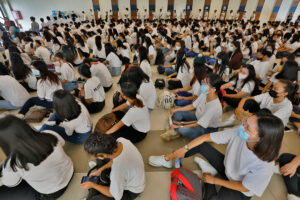
DepEd, CHED disagree on opening up education to foreigners
By Kenneth Christiane L. Basilio
THE DEPARTMENT of Education (DepEd) and Commission on Higher Education (CHED) found themselves on opposing sides on the issue of opening up the education sector to foreign investors.
DepEd rejected the proposal at a House of Representatives hearing on Monday, saying it could affect the sense of nationalism of students. On the other hand, CHED said liberalizing the sector could make local colleges and universities more competitive.
“The proposed amendments by both houses of Congress have far-reaching consequences and serious implications with respect to the mandate of the department and the exercise of its function,” Education Undersecretary Omar Alexander V. Romero told congressmen.
He said allowing foreigners to run local educational institutions could dilute “fundamental aspects of Filipino identity, culture and values.”
But CHED Chairman Prospero E. De Vera III said allowing foreign ownership in the sector would help colleges and universities become more globally competitive.
“The commission does not object to the constitutional amendment that will open up control and administration of educational institutions to foreign nationals,” he told the hearing.
Mr. De Vera noted that while the law provides limited educational internationalization activities by local institutions, it remains ineffective in attracting foreign institutions compared with neighboring countries with a fully liberalized education sector.
The Philippines is one of the strictest countries when it comes to foreign ownership compared with its neighbors, according to a report by the Second Congressional Commission on Education.
“Only the Philippines has full ownership, establishment and enrollment restrictions stipulated in the Constitution,” commission chief legal officer Joseph Noel M. Estrada told congressmen.
Allowing foreign ownership is the first step aside from state incentives and policy adjustments by DepEd and CHED in fully realizing the benefits of education liberalization.
Meanwhile, House Deputy Speaker and Quezon Rep. David C. Suarez said proposed changes to the 1987 Constitution should be approved by plebiscite separate from the midterm elections next year to avoid politicizing the issue.
“We cannot allow the Constitution to undergo political mudslinging and be politicized by what happens during the midterm elections where politicians go back and forth,” he told a news briefing.
Philippine President Ferdinand R. Marcos, Jr. earlier said that his government might hold a plebiscite on Charter change (“Cha-cha”) alongside the midterm elections.
But Bataan Rep. Geraldine B. Roman said this would be “counterproductive.” “Holding the plebiscite earlier would be much better as it would allow the people to truly understand [the issue],” she told the same briefing.
“It’s a bit difficult to trust the same people who are part of the same previous coalitions whose push for Charter change has been mostly comprehensive, pro-administration and rarely backed by appropriate technical inputs from all affected sectors,” Ateneo de Manila University political science lecturer Hansley A. Juliano said in a Facebook Messenger chat.
“The House has been composed of the same people who uncritically vote for the policy agenda of the incumbent President of the day out of reliance on patronage and budgetary insertions,” he added.
Meanwhile, Senator Ana Theresia N. Hontiveros-Baraquel said at least seven senators are likely to oppose a Senate measure seeking to ease foreign ownership restrictions in the Constitution, which would be enough to block the proposal.
“They need at least 18 votes to approve Resolution of Both Houses No. 6, so we just need seven to stop this,” she told reporters in Filipino, based on a transcript e-mailed by her office. “The situation is still fluid, but I’m very hopeful to get at least seven.”
The committee on constitutional amendments will hold a similar hearing on Tuesday where education experts are expected to speak.
Ms. Hontiveros -Baraquel said Senate Minority Leader Aquilino Martin “Koko” D. Pimentel III spoke with several senators on Charter change to gauge those in favor of amending the 1987 Constitution.
Senator Cynthia A. Villar has said she is against changing the 1987 Constitution, adding that the government should instead improve the ease of doing business in the country and deter corruption. — with John Victor D. Ordoñez



